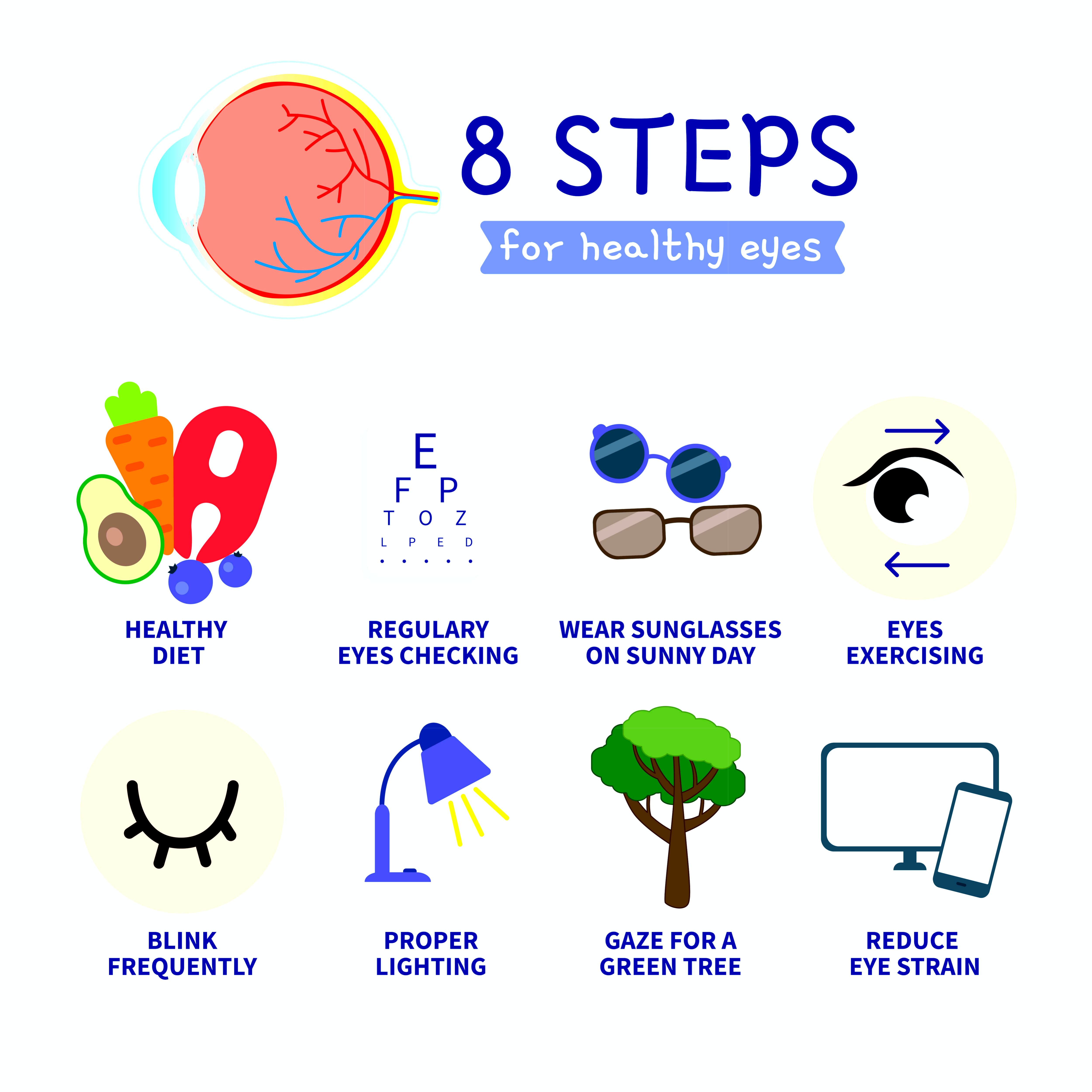Featured
Healthy and balanced vision is a keystone of high quality of life, yet many individuals underestimate the significance of nutrition in maintaining eye wellness. A diet plan rich in particular nutrients can secure your eyes, reduce the risk of establishing typical eye illness, and support overall eye function. Let's explore exactly how nutrition influences your eyesight and the essential nutrients you must include in your daily meals.
Important Nutrients for Eye Health
Vitamin A. Understood for its role in protecting vision, vitamin A is vital for preserving a healthy cornea and making it possible for low-light vision. Shortage in vitamin A can lead to evening blindness and other severe eye problems. Superb sources include carrots, sweet potatoes, and dark leafy eco-friendlies.
Lutein and Zeaxanthin. Found in high focus in the retina, these anti-oxidants safeguard against damage triggered by blue light and oxidative tension. Consuming foods like spinach, kale, broccoli, and eggs can aid maintain your eyes healthy and balanced.
Omega-3 Fat. Omega-3s are important for the wellness of the retina and can help in reducing symptoms of dry eye syndrome. Include fatty fish such as salmon, tuna, and mackerel in your diet plan, or go with plant-based resources like chia seeds and walnuts.
Vitamin C. A powerful antioxidant, vitamin C supports the health of capillary in the eyes and may lower the danger of cataracts. Foods rich in vitamin C consist of oranges, strawberries, bell peppers, and tomatoes.
Vitamin E. This nutrient protects eye cells from oxidative damage. Include almonds, sunflower seeds, and avocados right into your meals to increase vitamin E levels.
Zinc. Zinc plays an essential function in transporting vitamin A from the liver to the retina, assisting in the manufacturing of melanin, a protective pigment in the eyes. Foods such as oysters, beef, and fortified grains are excellent resources.
![]()
Stopping Eye Issues With Diet Regimen
Macular Degeneration: Antioxidants like lutein, zeaxanthin, and vitamins C and E can aid slow down the development of age-related macular deterioration (AMD)
Cataracts: Adequate consumption of vitamin C and various other antioxidants might protect against or delay the onset of cataracts.
![]()
Dry Eyes: Omega-3 fatty acids help boost tear quality and alleviate completely dry eye signs.
Diabetic Retinopathy: A diet regimen reduced in polished sugars and rich in whole foods can aid manage blood sugar level degrees, decreasing the danger of this condition in individuals with diabetic issues.
Practical Nutrition Tips
Diversify Your Diet Plan: Include a selection of fruits, veggies, lean healthy proteins, and entire grains to ensure you're getting a variety of nutrients.
Limit Processed Foods: Reduce consumption of added sugars and harmful fats, which can contribute to systemic wellness problems influencing your eyes.
Remain Hydrated: Correct hydration supports tear manufacturing and avoids eye dry skin.
Consider Supplements: If your diet regimen lacks details nutrients, consult a medical care service provider regarding taking supplements for better eye wellness.
Conclusion
![]()
Excellent nourishment is a necessary element of preserving ideal eye health and wellness. By integrating nutrient-dense foods right into your diet plan, you can minimize the threat of eye illness and secure your vision for the long term. Making notified dietary selections today can guard your sight for years to come. A consultation with a nutritionist or health care expert can provide individualized support customized to your requirements. if you're uncertain where to begin.
Important Nutrients for Eye Health
Vitamin A. Understood for its role in protecting vision, vitamin A is vital for preserving a healthy cornea and making it possible for low-light vision. Shortage in vitamin A can lead to evening blindness and other severe eye problems. Superb sources include carrots, sweet potatoes, and dark leafy eco-friendlies.
Lutein and Zeaxanthin. Found in high focus in the retina, these anti-oxidants safeguard against damage triggered by blue light and oxidative tension. Consuming foods like spinach, kale, broccoli, and eggs can aid maintain your eyes healthy and balanced.
Omega-3 Fat. Omega-3s are important for the wellness of the retina and can help in reducing symptoms of dry eye syndrome. Include fatty fish such as salmon, tuna, and mackerel in your diet plan, or go with plant-based resources like chia seeds and walnuts.
Vitamin C. A powerful antioxidant, vitamin C supports the health of capillary in the eyes and may lower the danger of cataracts. Foods rich in vitamin C consist of oranges, strawberries, bell peppers, and tomatoes.
Vitamin E. This nutrient protects eye cells from oxidative damage. Include almonds, sunflower seeds, and avocados right into your meals to increase vitamin E levels.
Zinc. Zinc plays an essential function in transporting vitamin A from the liver to the retina, assisting in the manufacturing of melanin, a protective pigment in the eyes. Foods such as oysters, beef, and fortified grains are excellent resources.

Stopping Eye Issues With Diet Regimen
Macular Degeneration: Antioxidants like lutein, zeaxanthin, and vitamins C and E can aid slow down the development of age-related macular deterioration (AMD)
Cataracts: Adequate consumption of vitamin C and various other antioxidants might protect against or delay the onset of cataracts.

Dry Eyes: Omega-3 fatty acids help boost tear quality and alleviate completely dry eye signs.
Diabetic Retinopathy: A diet regimen reduced in polished sugars and rich in whole foods can aid manage blood sugar level degrees, decreasing the danger of this condition in individuals with diabetic issues.
Practical Nutrition Tips
Diversify Your Diet Plan: Include a selection of fruits, veggies, lean healthy proteins, and entire grains to ensure you're getting a variety of nutrients.
Limit Processed Foods: Reduce consumption of added sugars and harmful fats, which can contribute to systemic wellness problems influencing your eyes.
Remain Hydrated: Correct hydration supports tear manufacturing and avoids eye dry skin.
Consider Supplements: If your diet regimen lacks details nutrients, consult a medical care service provider regarding taking supplements for better eye wellness.
Conclusion

Excellent nourishment is a necessary element of preserving ideal eye health and wellness. By integrating nutrient-dense foods right into your diet plan, you can minimize the threat of eye illness and secure your vision for the long term. Making notified dietary selections today can guard your sight for years to come. A consultation with a nutritionist or health care expert can provide individualized support customized to your requirements. if you're uncertain where to begin.
Latest Posts
Uncover Budget-Friendly Auto Repairs with Montclare’s Monthly Service Specials
Published May 25, 25
1 min read
Uncover Brake Repair & More: Full Services Guide from Montclare Auto Repair
Published May 24, 25
1 min read
Experience WyHy Federal Credit Union – Top Benefits for Members
Published May 24, 25
1 min read
More
Latest Posts
Uncover Budget-Friendly Auto Repairs with Montclare’s Monthly Service Specials
Published May 25, 25
1 min read
Uncover Brake Repair & More: Full Services Guide from Montclare Auto Repair
Published May 24, 25
1 min read
Experience WyHy Federal Credit Union – Top Benefits for Members
Published May 24, 25
1 min read